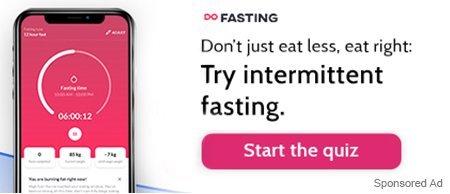what is Intermittent Fasting Plateau | why weight loss stops | 6 Tips to Break Intermittent Fasting Plateau
Intermittent fasting is undoubtedly the trendiest diet at the moment. And why wouldn’t it be? The many benefits of intermittent fasting, including effective weight loss, are backed by science and supported by nutritionists and social media health gurus. Several people have hopped on to this new diet trend and have successfully lost weight. But what about the intermittent fasting plateau we keep hearing about?
What is an Intermittent Fasting Plateau?
According to experts, you are bound to reach a weight loss plateau no matter which diet you follow. During a weight loss plan, your body loses around 5 to 10% of total body weight in the first few weeks. After that, you reach a weight loss plateau during which your body ‘resets itself.’ Understanding the science behind the stagnation will help you identify and correct the causes behind the weight loss plateau.

So, it can be disappointing and confusing when despite diligently following the diet regimen and sweating yourself out, you just stop losing weight. You did your homework, put in the work, and lost some weight. But now, the scale refuses to budge, and your weight loss has slowed down or stopped completely.
It’s common to wonder if intermittent fasting stopped working. However, we assure you that it hasn’t. You have just reached the intermittent fasting plateau, as several other people do. Experiencing an intermittent fasting weight loss plateau can be incredibly demotivating, but it is also completely normal.
So the next question is, how are you going to bust the intermittent fasting plateau. The following article will shed light on the reason behind your weight loss plateau and how you can successfully overcome your stagnant weight.
To know more about tips to lose weight while intermittent fasting read, Intermittent Fasting For Weight Loss: 7 Tips For Best Results.
A weight-loss journey has phases of weight loss and weight maintenance until you hit your weight goal. You might get frustrated and want to quit when the progress continues and then eventually plateau. However, the stalling part or plateau is vital for your body.

Why am I Not Losing Weight During Intermittent Fasting?
In the first few weeks of your intermittent fasting, you will lose weight quickly as your body releases its stored energy partly made of water. It results in weight loss that’s mostly water. Later, your body flips its metabolic switch and starts burning fat as an energy source, leading to weight loss.
During this process, your body will reach a plateau in your intermittent fasting. It does not mean that your healthy lifestyle has stopped working. It just indicates that your body is trying to readjust and reset. Your body likes homeostasis, the process by which your body maintains a stable condition. Hence, it has a natural ‘set point’ for your weight.
Experts estimate that our body weight has a set point range of 5-10%. This means that your body can lose or gain between 4-10 kgs without too much resistance. After this initial weight loss, your body starts functioning within its set point and tries its best to maintain it. The intermittent fasting plateau allows your body to reset to a lower set point weight. It requires patience and time.
However, not all is lost. You need to work alongside your body and identify the reasons that have made your weight scale stagnant. There are steps that can help you bust your intermittent fasting plateau.
6 Tips to Break Intermittent Fasting Plateau
1. Start Tracking Your Calorie Intake

Intermittent fasting has become increasingly popular because it does not prohibit people from eating. This diet just limits your eating window that leads to calorie restriction. Many people following the intermittent fasting plan for a long time become lax in counting their calories during their eating window.
You may be eating too many calories during your eating period, nullifying the calorie deficit achieved during the fasting period. If you overdo your calories during your non-fasting period, the calorie deficit achieved during the fasting window won’t be able to offset it.
Keep a food journal and carefully lodge your calories for one week. It will help your figure out if you are increasing your calorie intake drastically during your eating window. It will help you figure out where you are falling short and eat your food more mindfully.
You can also eat moderate portions of food during your non-fasting period to be more careful about the exact number of calories you are consuming. Tracking what you eat can help you shift or remove some eating habits that will help you break the intermittent fasting plateau faster.
2. Make Quality Sleep Your Priority

There is a lot of emphasis on the quality of your sleep, and it’s not overrated. If you’re not sleeping properly, no amount of workout and intermittent fasting can help you lose weight.
Sleep disturbances will throw your hormones for the loop, impact your appetite and metabolism. Insufficient sleep can make you crave more calories and make it harder for your body to go through a long fasting period.
To improve your sleep quality, fix a bedtime and wake-up routine. Try going to bed and waking up at the same time every day. Don’t exercise two to three hours before bed, and avoid screens a few hours before bed. The environment you sleep in influences the quality of your sleep. Try sleeping in a dark, quiet, and cool place. If your mind feels restless before bed, indulge yourself in some mindful meditation to calm your nerves.
3. Have Your Meal Two to Three Hours Before Bed
Your body flips its metabolic switch during your sleep, and instead of storing fat, it starts burning the fat as an energy source. This will help you feel calm and reduce your hunger pangs. However, if your body uses muscle tissue for energy, you will feel low on energy and have increased hunger.
To maximize your body’s capacity to burn fat at night, you should complete your last meal by 8 pm. Make sure that you consume most of your calories during the earlier part of the day. Dinner should be a light meal.
Eat fewer calories close to your bedtime, especially if you are experiencing an intermittent fasting weight loss plateau. You can eat larger meals earlier in the intermittent fasting eating window and taper off to smaller portions later.

4. Choose the Right Food
Not all calories are equal and healthy. If you are not eating the right kind of food and consuming good calories during your non-fasting period, intermittent fasting is simply not going to work for you. Eating sugary foods gives a quick spike of energy, but it’s not long-lasting. Opting for a pastry over a smoothie during your eating window will not show you the same results even if they have similar calories.
Eat foods that are rich in fiber and protein. If your intermittent fasting weight loss has plateaued, look at your diet as a whole. You may have dropped the ball with your nutrition and become lax about eating the right macro and micronutrients.
Need help in planning your fasting meal? Check out our 21-day intermittent fasting meal plan that gives you a customized meal plan helping you achieve weight loss goals.
5. Exercise Well

Intermittent fasting does focus on when you eat your food rather than what you eat. However, you can not expect to see effective results if you are not exercising during your diet. You need an energy deficit to promote weight loss. To do so, you need to move more while you are eating less. To break your intermittent fasting plateau, evaluate if you had reduced your workout compared to when you started.
Practicing low to moderate intensity workouts during your fasting period will help you maximize fat loss and keep your body in fat-burning mode. You can also incorporate resistance training in your workout schedule four to five times a week.
6. Get Your Hormones Checked

Your hormones play a significant role in influencing your weight loss. Intermittent fasting requires eating according to your metabolism, which is affected by hormones. You may be overeating or eating the wrong kind of food, which can disrupt your hormones.
Intermittent fasting can slow down your metabolism if you are restricting your calorie intake too much. This, along with incorrect eating patterns, can lead to hormonal issues that cause intermittent fasting plateau.
You can consult a health professional before starting the intermittent diet plan if you have any hormonal concerns.
Final Take
Yes, I have experienced this personally as well! Don’t stop, keep going, the benefits will be HUGE once you get past that plateau. Your body is getting healthier, its recovering, its renewing, so don’t get discouraged.
Hitting an intermittent fasting plateau with weight loss is quite normal. Do not be discouraged and accept it as a part of your weight loss journey. Your weight scale may not budge for some time, but you will observe changes in your energy levels and body measurements while following intermittent fasting.
Examine your diet, sleeping patterns, and calorie intake and make the necessary adjustments to break the intermittent fasting plateau. The weight scale does not reflect your health and wellness journey entirely. Stay consistent and shake up a few things in your daily routine to surprise your body from its daily activities.
Need an APP on your Mobile to help with Fasting? See our Top 6 FREE and Premium Fasting Apps
Also……











